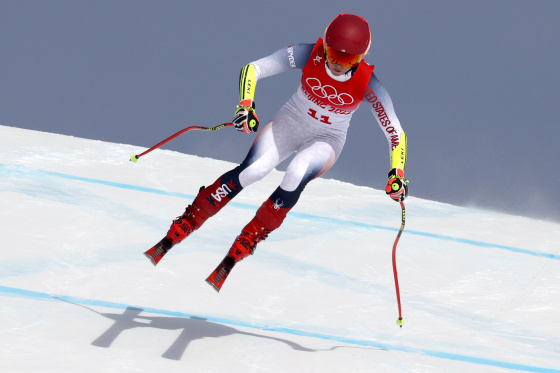U.S. star skier Mikaela Shiffrin returned to the slopes Friday, placing ninth in Super-G after back-to-back heartbreaking early exits at the Beijing Games.
Expectations for a gold in Super-G were muted — she has never entered that discipline at an Olympics despite medaling in world championships — but the 26-year-old was eager for a chance to refocus.
And refocus she did. Shiffrin didn't medal but skied her run in1:14:34 — 0.79 behind the winner — earning her a spot in the top 10 out of a field of 44 women.
Lara Gut-Behrami of Switzerland took the gold with a run in 1:13:51, Mirjam Puchner of Austria won silver and Michelle Gisin of Switzerland got bronze.
“I proved to myself that I can still trust my instincts a bit, and that’s really, really huge,” Shiffrin said after her race. “And for all the people who have been sending me support, I can only say: Thank you.”
Shiffrin had said she wanted a “reset” after skiing out and failing to finish in the giant slalom and slalom, her two strongest events and in which she has won Olympic gold in the past.
Ahead of the Friday’s race, Shiffrin tweeted an optimistic message and said she was looking forward to it.
“Well I’ve had a lot of support over the last 48 hours and I have to thank everyone for that,” she wrote.
“Today is Super G, and Super G is fun. I can’t express how grateful I am to have the opportunity to refocus on a new race, in the sport that I love so much. Onward,” she said in the message.
She won world championship gold in Super-G in 2019 and bronze in 2021.
Shiffrin had a disappointing start to the Beijing Games when she skied out of her first two events, giant slalom and slalom, on Monday and Wednesday.
She has won Olympic gold in both of those events in the past. She won gold in giant slalom at the PyeongChang Games in 2018, where she also won silver in Alpine combined, and gold in slalom at Sochi in 2014.
After Shiffrin failed to finish in Wednesday’s slalom, exiting early at the fifth gate, she appeared despondent.
She sat in the snow with her head bowed and said later “it makes me second-guess, like, the last 15 years.”
Shiffrin’s boyfriend, Norwegian skier Aleksander Aamodt Kilde, described her as being “in a good state; she’s all right,” The Associated Press reported before Friday’s race.
“She’s a hero and she can handle this. She handles pressure like no one else, and this is something she will come out of,” Kilde, who has won silver and bronze in two Alpine skiing events this Olympics.
Shiffrin is an Alpine ski superstar. She first made it onto a World Cup podium when she was 16. In addition to three Olympic medals — two gold, one silver — she has three World Cup overall titles, 73 career race wins and six world championship gold medals.
She was 18 years old when she won her first Olympic gold at the Sochi Games eight years ago, becoming the youngest person to win in slalom at any Olympics.
Shiffrin has said she wants to compete in all five individual events at these Games in Beijing, which means there are potentially two more.
The next two individual Alpine medal events are women’s downhill on Tuesday and the women’s Alpine combined on Thursday. Shiffrin said that the Super-G made her more optimistic about downhill events. The Alpine combined has slalom in it.
If she wins an Olympic gold medal at Beijing, she will be the first U.S. Alpine skier to win three Olympic gold medals over a career.
Shiffrin called the messages of support incredibly kind. She said she is disappointed in how the giant slalom and slalom ended, because she wanted to ski well.
“The most surprising thing of my Olympic experience is how kind people have been in the face of my failure,” Shiffrin said.
“I mean, it is failure. It’s OK to say that. I’m OK with that,” she said. “And I’m sorry for it, but I also was trying, and I’m proud of that.”

